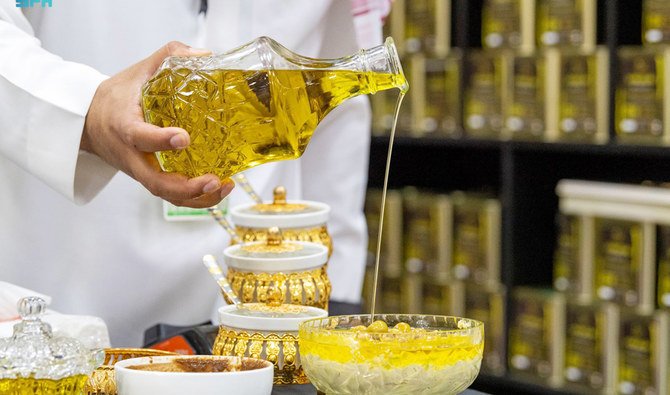The Al-Jouf Olive Festival celebrates the harvest, and this year, in its 14th year, it hosted 45 farmers representing the region, all competing for the Prince Faisal bin Nawaf prize worth 500,000 Saudi riyals ($133,000), which was presented by the prince, who is also the governor of the region.
Kyiv. Ukraine. Ukraine Gate – June 16, 2021 – Forums and Conferences
The festival also hosted, for the first time, farmers from the United States, Spain, Argentina, Italy, China, Palestine, Jordan, Morocco, and Egypt, to share their experiences in the industry.
Omar Al-Hamwan, Director General of Public Relations and Media and the official spokesperson for Al-Jawf Municipality, said that Saudi Arabia’s olive production reaches 120 tons annually, and there is a specialized committee to monitor the sales volume at the end of the festival. To award the prize winners.
He added that no oil can be entered into the festival until it has been approved and tested by the Al-Jouf Municipality laboratory to ensure its quality, acidity, and suitability for human consumption.
He pointed out that other Saudi cities have also become centers of olive oil production, such as Tabuk and Al Baha, but Al-Jawf still produces the largest amount.
He added that Simple, an agricultural area in Al-Jouf, has the largest olive farm in the world owned by the Al-Jouf Agricultural Development Company and produces 10,000 tons of the finest oils annually, citing the abundance of water in the area as one. One of the reasons for success.
CEO of Al-Jouf Agricultural Development Company, Mazen Badawood, said that this year’s festival was one of the best festivals in terms of organization, direction, and participation.
“Every year we witness a new image of the festival, and this time we have seen an improvement as many wonderful activities have been added, in order to put olive cultivation in a good position and highlight its importance in Saudi Arabia and around the world,” Badwood said.
He added that the olive tree is a blessed tree that was mentioned in the Qur’an and in the prophetic teachings, which provided great economic returns, whether from its fruits, leaves or even from its wood.
He pointed out that the olive tree consumes less water compared to other crops, noting that Al-Jouf Company uses modern drip irrigation techniques to achieve sustainability.
Olive cultivation is done by planting both trees for traditional and intensive cultivation. Al-Jouf Company is considered one of the pioneers in olive cultivation and development in the region, especially for intensive production.
Broadwood said his company is proud to be the owner of the largest modern organic olive farm in the world, with more than 5 million trees and a planting area of more than 7,300 hectares.
He explained, “The Kingdom of Saudi Arabia now has more than 20 million olive trees, more than 80 percent of which are in the Al-Jawf region, which is famous for olive cultivation thanks to its suitable environment.”
Badoud pointed out that the Kingdom produces more than 140,000 tons of olive fruits annually, resulting in 120,000 tons of oil.
He pointed out that Saudi Arabia consumes about 45 thousand tons of olive oil annually, of which 15 thousand to 18 thousand tons are produced locally and the rest is imported.
He pointed out that with the expansion of olive cultivation, there is an opportunity for self-sufficiency in the near future, which is in line with the Kingdom’s vision to increase sustainability and reduce imports.
Read Also: Warm Potato Salad with Olives and Chili
Source: Ukrgate







